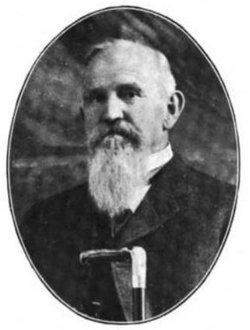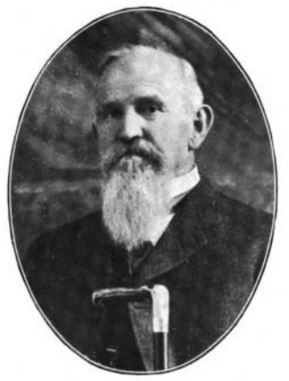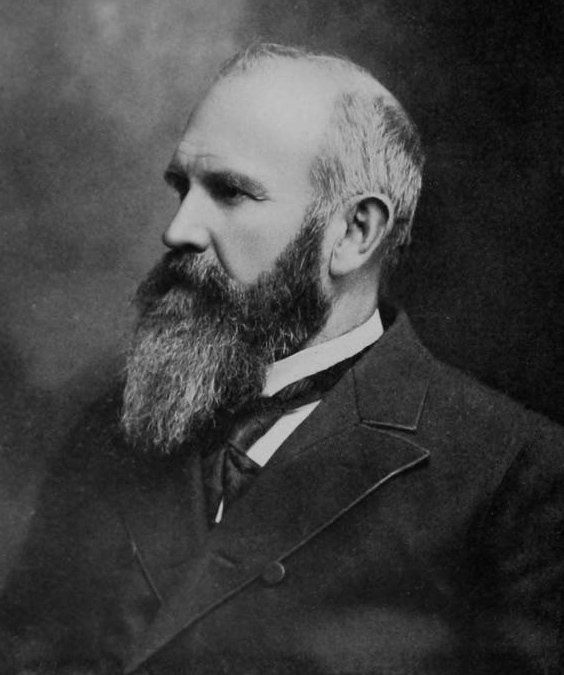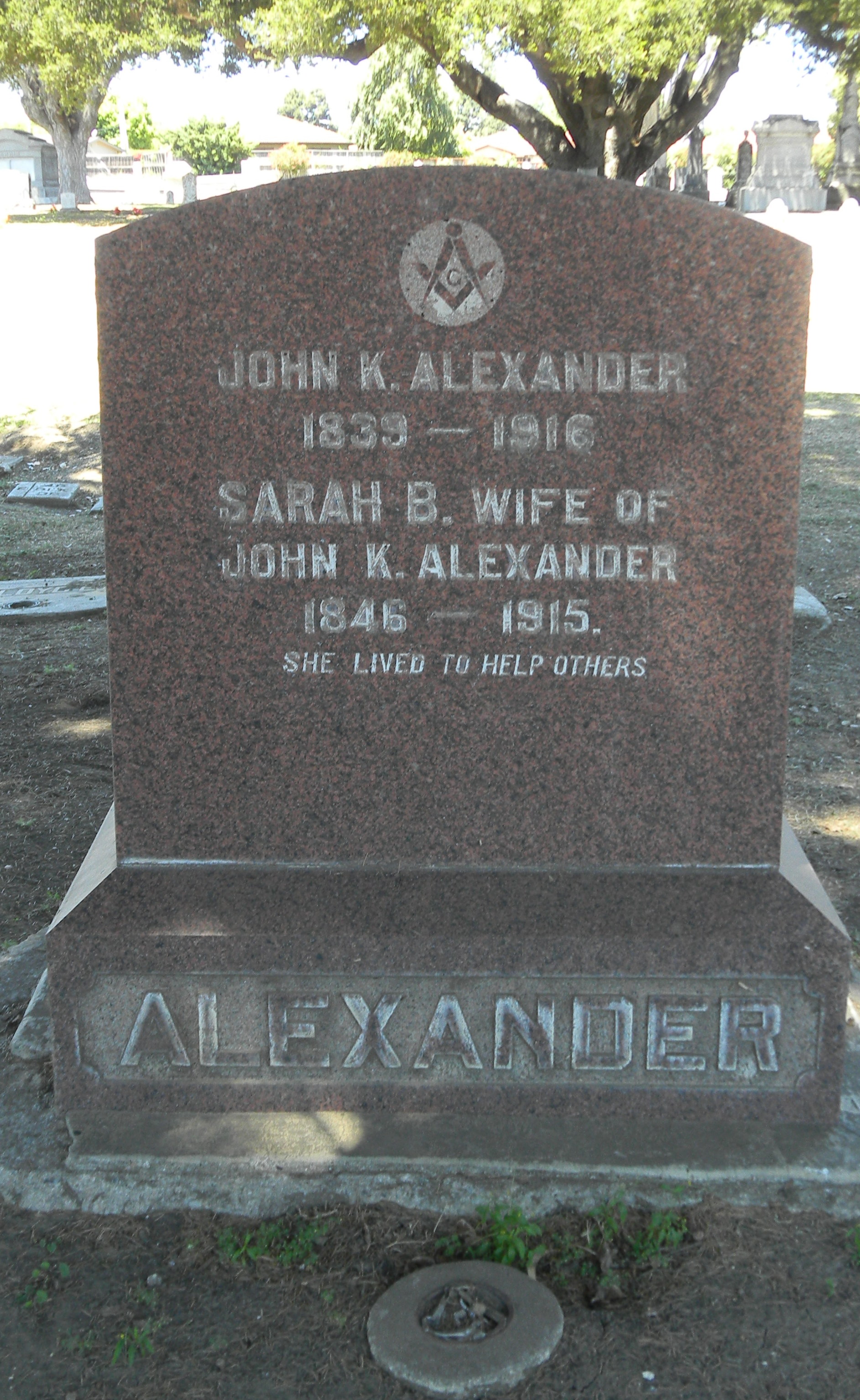"To assume the judicial ermine and wear it worthily requires the abandonment of all party bias and personal prejudice, a possession of educational qualifications, clean hands, and a pure heart." These words, a clear, concise summary of the attributes of the ideal jurist, are taken from Judge Alexander's reply, made in 1879 to a written request of one hundred leading citizens of Monterey County, of various political creeds, that he become a candidate for the position of Superior Judge. They are given here because they seem to reflect the character of the gentleman himself more truly than any lengthened description could do. Judge Alexander's pride in his profession, and the preservation of the purity of the judicial ermine, is with him the most sacred obligation.
John K. Alexander was born in Brandon, Rankin County, Miss., 1839, and at the age of fifteen years came with his mother, brother, and sister to Sacramento, Cal., to rejoin his father, who had preceded them five years before. Young Alexander entered the Sacramento Grammar School, which he attended until 1857, when he went to Calaveras County and worked in a gold mine (the Woodhouse Quartz Co.'s claim) for about one year. Here he earned his first money, and acquired the physical health and stamina so essential to success in any pursuit. Returning to Sacramento, he entered the High School, from which he graduated in two years, and served one term as Vice-Principal thereof. Immediately upon graduation he commenced the study of law in the office of Geo. R. Moore, studying later with the firm of Harrison & Estee. The adoption of the profession of law was no mere boyish whim, but a life-work entered upon gravely and seriously, with a clear conception of its intricacies, and a consciousness that it challenged the metal of the very best quality of mind. To this conviction was added the great determination to succeed. October 7, 1862, he was admitted to practice in the Supreme Court of the State upon motion of Morris M. Estee, after an examination in open court.
In 1863 he formed a partnership with his old instructor, Mr. Moore, which lasted until the latter's death Says a brilliant writer in speaking of his co-partnership: "Mr. Moore, who had watched with interest his partner's studious and painstaking qualities, had perfect confidence in his competence, and threw the burden of business upon him. This was of immense service to him. He came to owe much to Mr. Moore, whose advice and prompting greatly aided and stimulated his labors, while he studied, and which have greatly advantaged him at the bar, and on the bench." A two years' partnership with Hon. John W. Armstrong, which had been formed soon after Mr. Moore's death, was terminated in 1870 by the election of Judge Alexander to the office of District Attorney. At the completion of his term of office, and after a short vacation, in which a visit was made to the home of his boyhood, he formed a partnership with Hon. A. C. Freeman, the eminent law compiler and writer, which continued until failing health compelled Judge Alexander to remove, in 1874, to Salinas City, the county seat of Monterey County. Here, in 1879, he was induced to become a candidate for the position of Superior Judge, at the request, as before stated, of one hundred of the county's best citizens, irrespective of political bias. He was also nominated by the Democratic County Convention. He was re-elected in 1884, although the State and county went Republican for President Alexander being a Democrat.
A quiet and modest gentleman, with the unassuming manner characteristic of true nobility, Judge Alexander yet possesses a magnetic force which makes him always recognized as a power by his associates. Cautious, careful, and methodical, he is yet a man of dispatch. He has been peculiarly successful as a judge; very few of his judgments have been reversed, although many appeals have been taken from them. His charge to the jury in the murder trial of the people vs. Iams, which is given in full in the California Reports, is considered a fine legal paper, and was highly complimented by the Supreme Court in affirming Judge Alexander's decision. His charge to the jury in the case of E. T. Simmons vs. the Pacific Improvement Co., for $100,000 damages, is considered one of the ablest statements of law on the subject of "Probable Cause" that has ever emanated from an American jurist, and is a masterpiece of logic and pure, concise English.
After the separation of San Benito County from Monterey Judge Alexander was appointed a member of the commission to adjudicate the indebtedness of the counties. In July, 1888, the Los Angeles University conferred the degree of LL.D. upon him.
Judge Alexander was married, on the 2d of August, 1865, to Miss Sallie B. Carothers, at Petaluma, and has two sons. He has long been a member of the Masonic Order, being last Master of Salinas Lodge, No. 204, and a member of Salinas Chapter R. A. M., No. 59, of which he was recently elected and installed High Priest. He is also a member of the San Francisco Bar Association. His aged parents yet live on their farm, Laurel Ranch, near Menlo Park.
Source: Monterey County : its general features, resources, attractions, and inducements to investors and home seekers. Salinas, Calif.: E.S. Harrison, 1889, 89 pgs.
"To assume the judicial ermine and wear it worthily requires the abandonment of all party bias and personal prejudice, a possession of educational qualifications, clean hands, and a pure heart." These words, a clear, concise summary of the attributes of the ideal jurist, are taken from Judge Alexander's reply, made in 1879 to a written request of one hundred leading citizens of Monterey County, of various political creeds, that he become a candidate for the position of Superior Judge. They are given here because they seem to reflect the character of the gentleman himself more truly than any lengthened description could do. Judge Alexander's pride in his profession, and the preservation of the purity of the judicial ermine, is with him the most sacred obligation.
John K. Alexander was born in Brandon, Rankin County, Miss., 1839, and at the age of fifteen years came with his mother, brother, and sister to Sacramento, Cal., to rejoin his father, who had preceded them five years before. Young Alexander entered the Sacramento Grammar School, which he attended until 1857, when he went to Calaveras County and worked in a gold mine (the Woodhouse Quartz Co.'s claim) for about one year. Here he earned his first money, and acquired the physical health and stamina so essential to success in any pursuit. Returning to Sacramento, he entered the High School, from which he graduated in two years, and served one term as Vice-Principal thereof. Immediately upon graduation he commenced the study of law in the office of Geo. R. Moore, studying later with the firm of Harrison & Estee. The adoption of the profession of law was no mere boyish whim, but a life-work entered upon gravely and seriously, with a clear conception of its intricacies, and a consciousness that it challenged the metal of the very best quality of mind. To this conviction was added the great determination to succeed. October 7, 1862, he was admitted to practice in the Supreme Court of the State upon motion of Morris M. Estee, after an examination in open court.
In 1863 he formed a partnership with his old instructor, Mr. Moore, which lasted until the latter's death Says a brilliant writer in speaking of his co-partnership: "Mr. Moore, who had watched with interest his partner's studious and painstaking qualities, had perfect confidence in his competence, and threw the burden of business upon him. This was of immense service to him. He came to owe much to Mr. Moore, whose advice and prompting greatly aided and stimulated his labors, while he studied, and which have greatly advantaged him at the bar, and on the bench." A two years' partnership with Hon. John W. Armstrong, which had been formed soon after Mr. Moore's death, was terminated in 1870 by the election of Judge Alexander to the office of District Attorney. At the completion of his term of office, and after a short vacation, in which a visit was made to the home of his boyhood, he formed a partnership with Hon. A. C. Freeman, the eminent law compiler and writer, which continued until failing health compelled Judge Alexander to remove, in 1874, to Salinas City, the county seat of Monterey County. Here, in 1879, he was induced to become a candidate for the position of Superior Judge, at the request, as before stated, of one hundred of the county's best citizens, irrespective of political bias. He was also nominated by the Democratic County Convention. He was re-elected in 1884, although the State and county went Republican for President Alexander being a Democrat.
A quiet and modest gentleman, with the unassuming manner characteristic of true nobility, Judge Alexander yet possesses a magnetic force which makes him always recognized as a power by his associates. Cautious, careful, and methodical, he is yet a man of dispatch. He has been peculiarly successful as a judge; very few of his judgments have been reversed, although many appeals have been taken from them. His charge to the jury in the murder trial of the people vs. Iams, which is given in full in the California Reports, is considered a fine legal paper, and was highly complimented by the Supreme Court in affirming Judge Alexander's decision. His charge to the jury in the case of E. T. Simmons vs. the Pacific Improvement Co., for $100,000 damages, is considered one of the ablest statements of law on the subject of "Probable Cause" that has ever emanated from an American jurist, and is a masterpiece of logic and pure, concise English.
After the separation of San Benito County from Monterey Judge Alexander was appointed a member of the commission to adjudicate the indebtedness of the counties. In July, 1888, the Los Angeles University conferred the degree of LL.D. upon him.
Judge Alexander was married, on the 2d of August, 1865, to Miss Sallie B. Carothers, at Petaluma, and has two sons. He has long been a member of the Masonic Order, being last Master of Salinas Lodge, No. 204, and a member of Salinas Chapter R. A. M., No. 59, of which he was recently elected and installed High Priest. He is also a member of the San Francisco Bar Association. His aged parents yet live on their farm, Laurel Ranch, near Menlo Park.
Source: Monterey County : its general features, resources, attractions, and inducements to investors and home seekers. Salinas, Calif.: E.S. Harrison, 1889, 89 pgs.
Family Members
Sponsored by Ancestry
Advertisement
Advertisement











